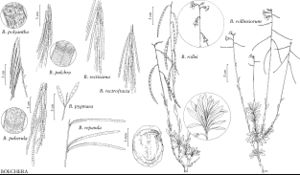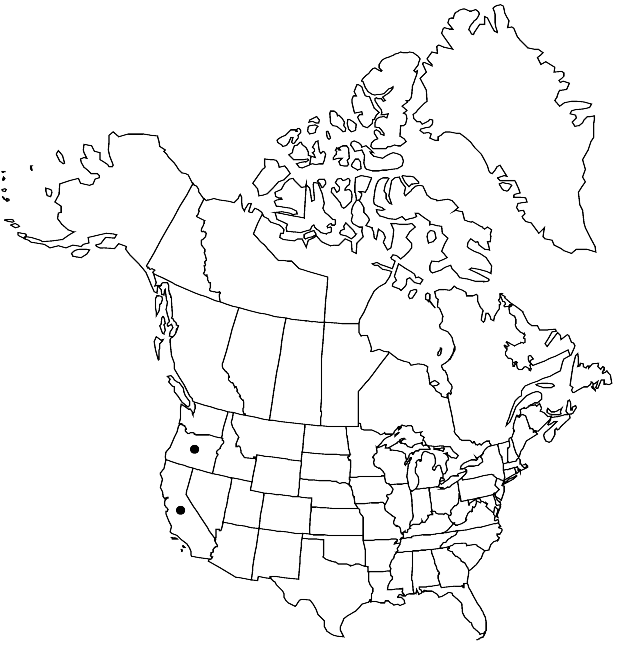Difference between revisions of "Boechera rectissima"
Novon 13: 388. 2003.
FNA>Volume Importer |
imported>Volume Importer |
||
| (3 intermediate revisions by 2 users not shown) | |||
| Line 10: | Line 10: | ||
|name=Arabis rectissima | |name=Arabis rectissima | ||
|authority=Greene | |authority=Greene | ||
| + | |rank=species | ||
|publication_title=Pittonia | |publication_title=Pittonia | ||
|publication_place=4: 191. 1900 | |publication_place=4: 191. 1900 | ||
| Line 16: | Line 17: | ||
|name=Arabis setigera | |name=Arabis setigera | ||
|authority=Greene | |authority=Greene | ||
| + | |rank=species | ||
}} {{Treatment/ID/Synonym | }} {{Treatment/ID/Synonym | ||
|name=Arabis wyndii | |name=Arabis wyndii | ||
|authority=L. F. Henderson | |authority=L. F. Henderson | ||
| + | |rank=species | ||
}} | }} | ||
|hierarchy=Brassicaceae;Brassicaceae tribe Boechereae;Boechera;Boechera rectissima | |hierarchy=Brassicaceae;Brassicaceae tribe Boechereae;Boechera;Boechera rectissima | ||
| Line 34: | Line 37: | ||
|elevation=1500-2500 m | |elevation=1500-2500 m | ||
|distribution=Calif.;Oreg. | |distribution=Calif.;Oreg. | ||
| − | |discussion=<p><i>Boechera rectissima</i> is easily recognized by its combination of glabrous stems, basal leaves with large, predominantly simple trichomes, short (3–4 mm), white petals, and strongly reflexed, appressed fruits. Plants assigned to < | + | |discussion=<p><i>Boechera rectissima</i> is easily recognized by its combination of glabrous stems, basal leaves with large, predominantly simple trichomes, short (3–4 mm), white petals, and strongly reflexed, appressed fruits. Plants assigned to <i></i>var.<i> simulans</i> appear to be hybrids between this species and <i>B. retrofracta</i>.</p> |
|tables= | |tables= | ||
|references= | |references= | ||
| Line 43: | Line 46: | ||
-->{{#Taxon: | -->{{#Taxon: | ||
name=Boechera rectissima | name=Boechera rectissima | ||
| − | |||
|authority=(Greene) Al-Shehbaz | |authority=(Greene) Al-Shehbaz | ||
|rank=species | |rank=species | ||
| Line 58: | Line 60: | ||
|publication year=2003 | |publication year=2003 | ||
|special status= | |special status= | ||
| − | |source xml=https:// | + | |source xml=https://bitbucket.org/aafc-mbb/fna-data-curation/src/2e0870ddd59836b60bcf96646a41e87ea5a5943a/coarse_grained_fna_xml/V7/V7_579.xml |
|tribe=Brassicaceae tribe Boechereae | |tribe=Brassicaceae tribe Boechereae | ||
|genus=Boechera | |genus=Boechera | ||
Latest revision as of 22:34, 5 November 2020
Biennials or perennials; short-lived; sexual; caudex present or absent. Stems usually 1 per caudex branch, arising from center of rosette near ground surface, 2–8(–10) dm, usually glabrous proximally, rarely sparsely pubescent, trichomes simple, to 0.7 mm, glabrous distally. Basal leaves: blade oblanceolate, 3–8(–13) mm wide, margins entire or denticulate, ciliate, trichomes (simple), 0.5–1.2 mm, surfaces sparsely to densely pubescent, trichomes simple, to 0.8 mm, often mixed with short-stalked, 2- or 3-rayed ones, 0.15–0.5 mm. Cauline leaves: 6–30(–45), often concealing stem proximally; blade auricles 1–1.5 mm, surfaces of distalmost leaves sparsely pubescent, sometimes margins ciliate. Racemes 10–30(–50)-flowered, usually unbranched. Fruiting pedicels reflexed, abruptly recurved at base, otherwise straight, 4–10 mm, glabrous. Flowers pendent at anthesis; sepals pubescent; petals white, 3–4 × 0.7–1.2 mm, glabrous; pollen ellipsoid. Fruits strongly reflexed, usually appressed to rachis, not secund, straight, edges parallel, 5–9 cm × 1.8–2.5 mm; valves glabrous; ovules 46–80 per ovary; style 0.2–0.8 mm. Seeds uniseriate, 1.8–2.1 × 1–1.5 mm; wing continuous, 0.15–0.25 mm wide.
Phenology: Flowering May–Jul.
Habitat: Rocky slopes in open conifer forests
Elevation: 1500-2500 m
Discussion
Boechera rectissima is easily recognized by its combination of glabrous stems, basal leaves with large, predominantly simple trichomes, short (3–4 mm), white petals, and strongly reflexed, appressed fruits. Plants assigned to var. simulans appear to be hybrids between this species and B. retrofracta.
Selected References
None.

